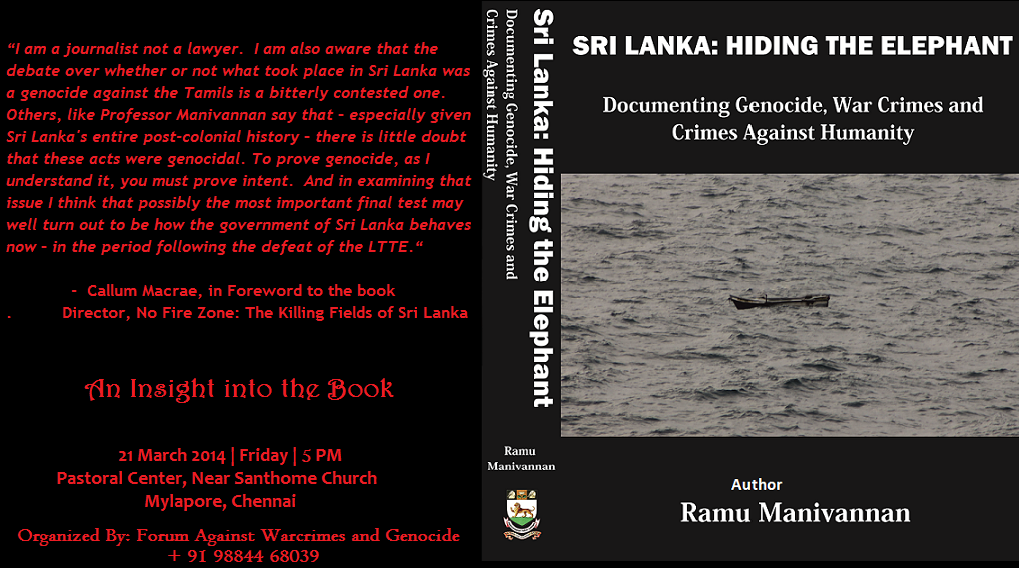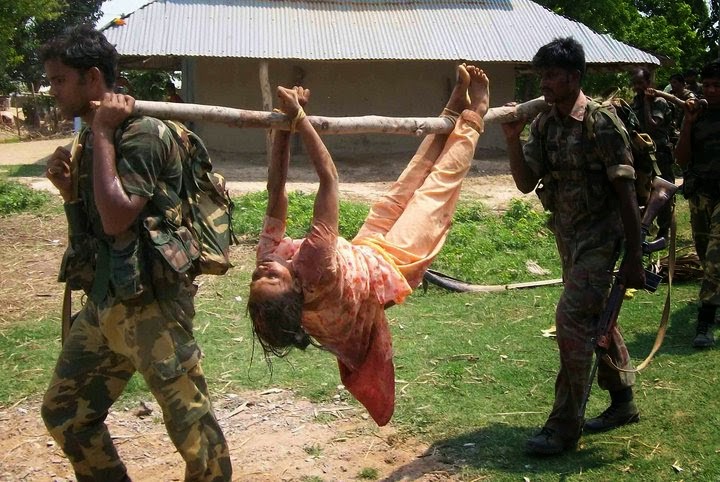Ramu Manivannan, Ed., Sri Lanka – Hiding the Elephant: Documenting Genocide, War Crimes and Crimes against Humanity (Department of Politics and Public Administration, University of Madras, Chepauk, Chennai – 600 005), pp. 976, Price Rs. 2000/-

Book review by Prof. V. Suryanarayan, ‘South Asia Analysis Group,’ August 13, 2014
Paper No. 5765
Book Review: Sri Lanka — Genocide, War Crimes and Crimes Against Humanity: An Invaluable Reference Book
In 1948, soon after independence, the Government of India appointed a Commission under the Chairmanship of Dr. S. Radhakrishnan to enquire into the prevalent higher education system and to make recommendations so that the Indian Universities could face the challenges of the post-independence era. One of the distinguished members of that Commission was Dr. Arthur E Morgan, the first Chairman of the Tennessee Valley Authority in the United States. In the course of the enquiry the Commission visited Visva Bharathi, the well known educational institution founded by Gurudev Rabindranath Tagore. The Vice Chancellor had organized a public meeting so that the members of the Commission could exchange views with the general public. Among the audience were few members of the Santhal tribe. Arthur Morgan asked the Vice Chancellor as to what extent the University has been able to enrich the lives of the Adivasis in whose midst it was situated.
Gandhiji and long before him Tolstoy subscribed to the same idea. In fact when the Indian National Congress assumed power in various states following the electoral victory in the elections held under the Government of India Act of 1935, the first advice that Gandhiji gave to them was to introduce universal education through the medium of some craft.
Prof. Ramu Manivannan is a strong advocate of this noble principle of higher education. Since assuming the Chairmanship of the Department of Politics and Public Administration Ramu has revamped and modernized the syllabus and teaching curriculum. Today the students are taught and scholars do research on issues of human rights, ongoing democratic struggles in South Asia and refugee issues. Ramu is not an ivory tower intellectual; he and his students are actively involved with movements for peace and justice in India and its neighbourhood. This edited volume is a testimony to the commitment of Ramu, his colleagues and students to understand and sensitize the public to the momentous developments taking place in India’s southern neighbourhood.
This edited volume is a result of collective effort. Special mention should be made of the untiring efforts of Dr. Ashik Bonofer who teaches Political Science in Madras Christian College. Dr. Bonofer is a scholar of great promise who is specialising in the political developments in Sri Lanka and Maldives. Mention should also be made of the rigorous work put in by students and research scholars – Parthiban, Divya, Radhika, Santosh, Priya, Nithya, Kalaiarasi and Karuna.
The book is divided into two sections. In the first part Prof. Ramu Manivannan has provided a succinct analysis of the political developments in Sri Lanka and the many acts of discrimination against the Tamils. He then proceeds to highlight how the war against the Tamils degenerated into a savage war against Tamil civilians. The second section includes eye witness accounts of the war, the report of the University Teachers of Human Rights (UTHR), submissions made to the UN Secretary General’s panel of experts, the UN Report, the Reports of the International Crisis Group, Human Rights Watch, Amnesty International, Report of the Tamil National Alliance (TNA) which lists out details of continuing military occupation and ongoing land colonization in the traditional Tamil homeland. The volume is first of its kind, which combines a brilliant analysis of the Fourth Eelam War with documentation to substantiate the arguments. This magnum opus is a good reference work for all students of contemporary South Asia.
In the introductory chapters, Prof. Ramu Manivannan has raised a very pertinent question – the contradiction between the principle of absolute sovereignty of the state and the global Responsibility to Protect (R2P). During recent years R2P is rapidly gaining ground as an important axiom in International Humanitarian Law. It is a simple, but at the same time, a very powerful idea. At present, the primary responsibility of protecting the people against mass atrocities and genocide lies with the State. State sovereignty implies responsibility to protect, not to kill. But when the State is unable or unwilling to abide by this primary responsibility, it is the duty of the international community to step in and uphold this principle. The primary tools of the international community are persuasion and support. But when this fails the international community must think in terms of international intervention to prevent catastrophe and genocide. R2P was unanimously adopted by the UN General Assembly in the world summit at 2005. But much more remains to be done before it becomes a universal axiom. The brain behind the R2P is Gareth Evans, the former Australian Foreign Minister, who played a stellar role in bringing peace to war torn Cambodia…
I would like to conclude the review with the famous lines of Pablo Neruda: “Perhaps this war will pass like others which divided us; leaving us dead, killing us along with the killers; but the shame of this time puts its burning fingers in our faces; who will erase the ruthlessness hidden in innocent blood?”.
(Dr, V, Suryanarayan is former Senior Professor, Centre for South and Southeast Asian Studies, University of Madras)
Orders for the book may be placed with the Department of Politics and Public Administration, University of Madras, Chepauk, Chennai – 600 005.

Prof Surya Narayanan is not willing to comment on the contents of the book and how it brings out the atrocities committed against the Tamil people. It is for the author to mention that who are people helped him in this work . Even he was not surprised to know that these crimes were committed in the island which was historical treated as Hindu province.
However this book deserves another review as the professor has failed in his duty.
Thank you
S.Paramalingam